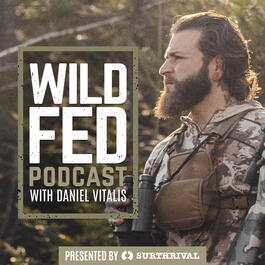
In the Shadow of Extinction with Dan Flores — WildFed Podcast #173
Well, it's finally here. The last interview of the WildFed Podcast. We'll be back next week with our producer Grant to do a final wrap-up, but as far as guest appearances go, who better to take us out than Dan Flores, and on what better topic than his new book, Wild New World. The book is incredible, even, dare we say, required reading for anyone who's been following the journey of this podcast. It's not just a history of North America and the animals that live here now — the extant animals — and the ones that were here before — the extinct ones. It's also the story of the human predator crossing through Beringia and being unleashed on a homonin-naive megafauna assemblage and the impacts that would have here over the proceeding 20,000 years or so. It traces its way through the Clovis and Folsom cultures, to the post-ice-age extinction events that led to the great mass of cultures we refer to as Native American, up to the point of contact with European explorers. Then, what follows, as we are all painfully aware, is the Great Dying, which led to the loss of some 80-90% of the indigenous peoples of the continent due to diseases that Europeans had developed significant immunity to but were novel to Native America. And of course, colonization and westward expansion. This then gives way to the most substantial human-induced biomass reduction in known history, the denuding of the land and the commodification of its wildlife — which comes with it several tragic, high-profile extinctions. This part of the book is both compelling and at the same time gruesome and loathsome to read about. It's truly a blemish on the history of this country and something we are a long way from reconciling still. Eventually, this leads to the beginnings of the modern conservation movement, which carries us through to the present day, exploring both its sometimes less-than-savory origins, but also its tremendous wins, like the Endangered Species Act. The book walks us through to the very present with some speculation about the future. When Daniel last spoke to Dan, he'd only read a few chapters, and those were some feel-good pages. He didn't really understand what was to come or how it would shake him to the core. He didn't expect it would cause him to reevaluate many of his assumptions or make him audit his own practices and how they relate to this bigger-picture history. It's so easy to forget that we live, not as isolated points in space and time, but rather in a continuum. Embedded in a fabric of living history. Without context for what has come before, we can inadvertently focus myopically on where we are now. Conservation is no different. While our methods for wildlife management are light-years ahead of where they were just a century ago, one thing we've learned making this show is there's still a LONG way to go. It's far from perfect. All that said, humans are and always have been — as long as our genus has existed — predators. Not just dietarily, but behaviorally. Those of us that hunt and fish know this in a very intimate way. The idea of giving that up is not really an option for most of us — despite the hopes of the planet's vegan contingent who believes we can just implement a species-wide dietary experiment on the human population without any malnourishment consequences to ourselves or children. Daniel has been down that road and it leads, in his opinion, off the rails and into nutritional bankruptcy. So, it seems to us that we need to learn to balance our needs, wants, and desires as a predatory animal with our needs, wants and desires for intact fauna and healthy ecosystems. No easy task. One that's not just centuries, but millennia, in the making. It seems to us that this decade could be characterized by a now hyper-connected and networked human race coming to terms with itself, its past, and its future. Those of us who champion a meaningful ecological trophic connection to wildlife are going to have to do the same. We hope, when the dust settles, we can still hunt, fish, and forage, since as Daniel has stated on this show dozens if not a hundred times — we think this is essentially human. Who knows where this all leads, but we're grateful to Dan for this book and the incredible work that must have gone into writing such a sweeping ecological and environmental history. We suspect this one is destined to be a classic. Dan is, no doubt, one of the most important environmental writers of our day, and it's an honor to have him back on the show — and especially as our final interview. As we mentioned earlier, we'll be back next week for one final, more intimate episode of the show. Thank you so much for following along on this journey, for your support, and for your listenership. It has meant the world to us! Now, here's our second interview with Dan Flores on his newest book, Wild New World! View full show notes, including links to resources from this episode here: https://www.wild-fed.com/podcast/173
From "WildFed Podcast — Hunt Fish Forage Food"


Comments
Add comment Feedback